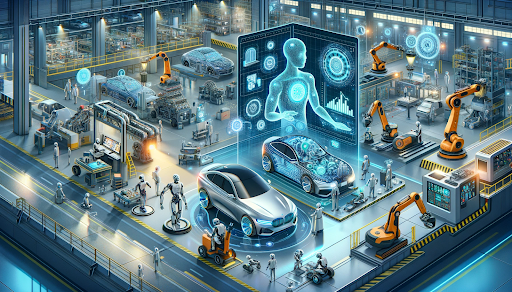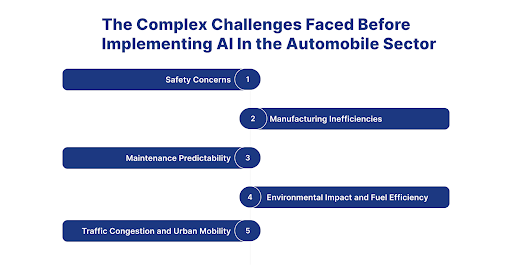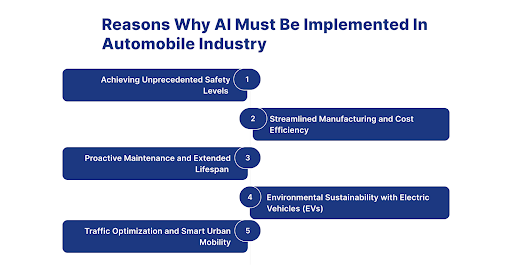AI In the Automobile Sector: 5 Reasons Why AI Must Be Implement In The Automobile Industry
Posted by Hitul Mistry
/10 Jan 24
Tagged under: # ai, aiinautomobile,automobile
implementing AI In the Automobile Sector offers a paradigm change in which past problems have given way to future defined by safety and environmental responsibility
Introduction

- In an age where technology is the driver for extraordinary change, the incorporation of AI has emerged as a driving force, altering industries worldwide. Nowhere is this more clear than in the car industry, which has experienced a fundamental shift due to breakthrough AI applications. This blog aims to investigate the dynamic movement from the obstacles encountered by the car industry before the broad adoption of AI In the Automobile Sector to the diverse advantages seen in the post-AI period. Using the "before and after" bridge content strategy framework, we will unravel the complexity that formerly defined the sector and reveal how AI has catapulted it into a new realm of safety, efficiency, and sustainability.
The Complex Challenges Faced Before Implementing AI In the Automobile Sector

1.Safety Concerns
- Before AI, the vehicle industry faced a slew of safety issues that had a substantial influence on road users. Human mistakes, ranging from inattentive driving to fatigue-induced lapses, were crucial for accidents. Furthermore, the unpredictability of road conditions and the inherent limitations of human responses produced a situation where total safety appeared unattainable. The industry realized the critical need for a solution to prevent these dangers while improving overall safety standards.
2.Manufacturing Inefficiencies
- Traditional manufacturing processes were defined by manual, labor-intensive operations, which resulted in inefficiencies on the production line. Quality control was a constant problem, resulting in a greater rate of failures and recalls. The precise cooperation necessary for assembling complex vehicle components frequently resulted in delays in the manufacturing schedule, raising prices, and impeding the delivery of new models. The industry sought technologies that simplify manufacturing processes, cut costs, and increase production efficiency.
3.Maintenance Predictability
- The world of car maintenance brought its own set of issues. Anticipating maintenance needs was like navigating in the dark without real-time data on the health and performance of vehicles. Reactive maintenance procedures were the norm, resulting in more significant downtime and higher maintenance expenses. Vehicle owners and manufacturers sought solutions that might give insights into possible difficulties before they became substantial, allowing for proactive maintenance plans and eventually improving vehicle reliability.
4.Environmental Impact and Fuel Efficiency
- Before AI, the car industry was concerned about the environmental effects of traditional automobiles. Internal combustion engines, the most common vehicle power source, contributed significantly to air pollution and greenhouse gas emissions. Achieving ideal fuel economy was a constant problem, and the industry was under increasing pressure to offer sustainable alternatives. With modern technology like AI, improving engine performance and lowering emissions remained easier, impeding progress toward environmentally friendly transportation alternatives.
5.Traffic Congestion and Urban Mobility
- Urbanization increased traffic congestion, particularly in highly populated regions. The increased number of vehicles on the road resulted in longer commuting times, fuel waste, and advanced driver discontent. During the pre-AI period, they needed more appropriate traffic management technologies, making it impossible to solve the intricacies of urban transportation. There was an urgent need for intelligent systems that could optimize traffic flow, alleviate congestion, and improve overall urban mobility—a goal that conventional transportation systems struggled to meet without the involvement of modern technology.
Reasons Why AI Must Be Implemented In Automobile Industry

1.Achieving Unprecedented Safety Levels
- The integration of AI In the Automobile Sector age has changed safety standards in the vehicle sector. AI-powered autonomous cars with advanced driver-assistance systems (ADAS) use real-time data and machine-learning algorithms to analyze complicated driving conditions. These cars can make split-second choices, recognize possible risks, and act autonomously to avoid accidents. As a result, there has been a dramatic drop in accidents caused by human error, signalling a paradigm shift toward unprecedented levels of road safety.
2.Streamlined Manufacturing and Cost Efficiency
- Implementing AI In the Automobile Sector Manufacturing processes vehicle sector have experienced a substantial revolution. AI-powered robots and automation have replaced manual, labour-intensive activities and streamlined the whole manufacturing process. Computer vision and machine learning algorithms monitor and regulate production elements, from assembly to quality control. This has resulted in significant cost savings, greater manufacturing efficiency, and shorter development cycles, allowing manufacturers to bring novel models to market quickly.
3.Proactive Maintenance and Extended Lifespan
- implementing AI In the Automobile Sector has changed vehicle maintenance in the post-AI landscape. Sensors built-in automobiles continually capture real-time data about numerous components, feeding it into AI systems. These algorithms evaluate data to detect flaws before they become critical, allowing for preventive maintenance. As a result, automobiles in the AI-powered age have less downtime, fewer maintenance expenses, and a longer lifespan overall.
4.Environmental Sustainability with Electric Vehicles (EVs)
- The post-AI age has witnessed a boom in the development and use of electric vehicles (EVs), a sustainable alternative to traditional internal combustion engines. AI is crucial in optimizing the performance of electric cars, regulating battery life, and improving overall energy economy. This transition to electric mobility corresponds with worldwide initiatives to lessen the environmental effect of transportation, marking a big step toward a more sustainable future.
5.Traffic Optimization and Smart Urban Mobility
- AI In the Automobile Sector has changed urban mobility by reducing traffic congestion and increasing transportation efficiency. AI-powered traffic management systems employ real-time data from numerous sources, including sensors and cameras, to improve traffic flow. Intelligent routing algorithms direct cars to avoid crowded regions, decreasing travel times and fuel usage. The post-AI era ushers in a new era of smart urban mobility, in which AI technologies contribute to a smooth and efficient transportation ecology.
Conclusion
- To summarize, implementing AI In the Automobile Sector offers a paradigm change in which past problems have given way to a future defined by safety, efficiency, and environmental responsibility. As we travel the roads of tomorrow, AI will be our constant companion, guiding the industry into unexplored realms of innovation and growth. The journey from pre-AI challenges to transformative outcomes in the post-AI landscape emphasizes the critical role that technology plays in shaping the future of transportation, and the automobile industry, in particular, stands as a testament to the limitless possibilities that AI brings to our roads.
How Digiqt will help you adapt AI in your company
-
At Digiqt, we are dedicated to assisting companies in automating critical processes. Our highly skilled and professional team ensures the timely development and delivery of AI software. We commence by thoroughly understanding our client's specific requirements, and based on these requirements, our proficient team develops the AI software. Furthermore, we provide our clients with monthly updates on the software development progress.
-
Digiqt's commitment to automation, client-centric software development, and regular updates ensures efficiency and effectiveness in streamlining insurance operations.
Contact Us
About Us
We are a trusted, quality driven and value-driven digital product development company delivering services in BFSI sector.
Digiqt Technolabs is a passion turned into a company. We are a trusted product development company that specializes in turning your ideas into digital solutions utilizing our years of experience in industry-leading technologies.
We deliver high-tech innovations and great solutions for our clients in the most efficient manner regardless of the project complexity.
We are trusted, quality-driven and value-driven product development company.

Our key clients
Companies we are associated with
Our Offices

Ahmedabad
706,31FIVE Building,opp.Palladium, Corporate Rd, Makarba, Ahmedabad, Gujarat.
+91 99747 29554

Mumbai
WeWork, Enam Sambhav C-20, G Block,Bandra- Kurla Complex, MUMBAI-400051, Maharashtra.
+91 99747 29554

Stockholm
Bäverbäcksgränd 10 12462 Bandhagen, Stockholm, Sweden.
+46 72789 9039












